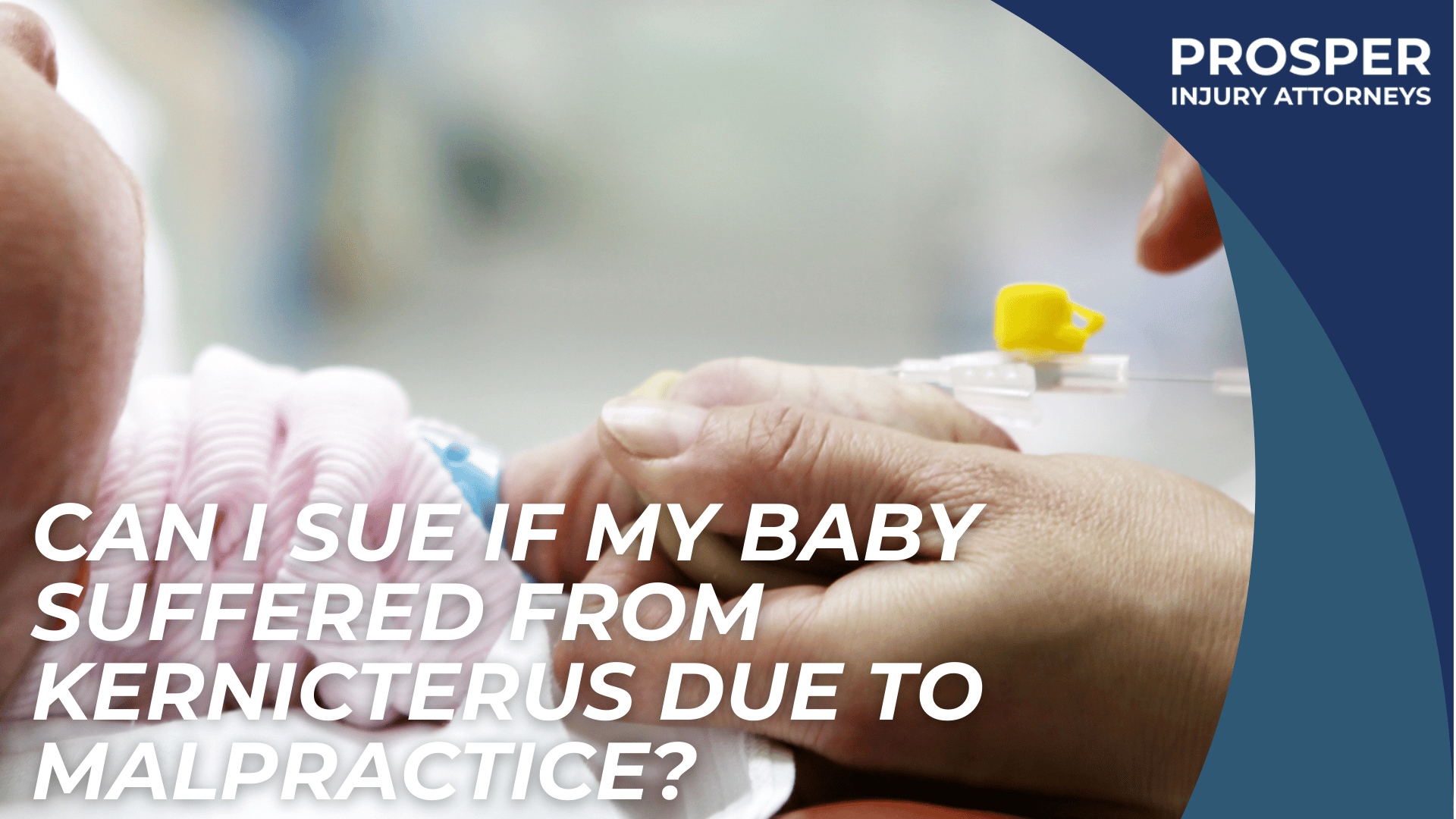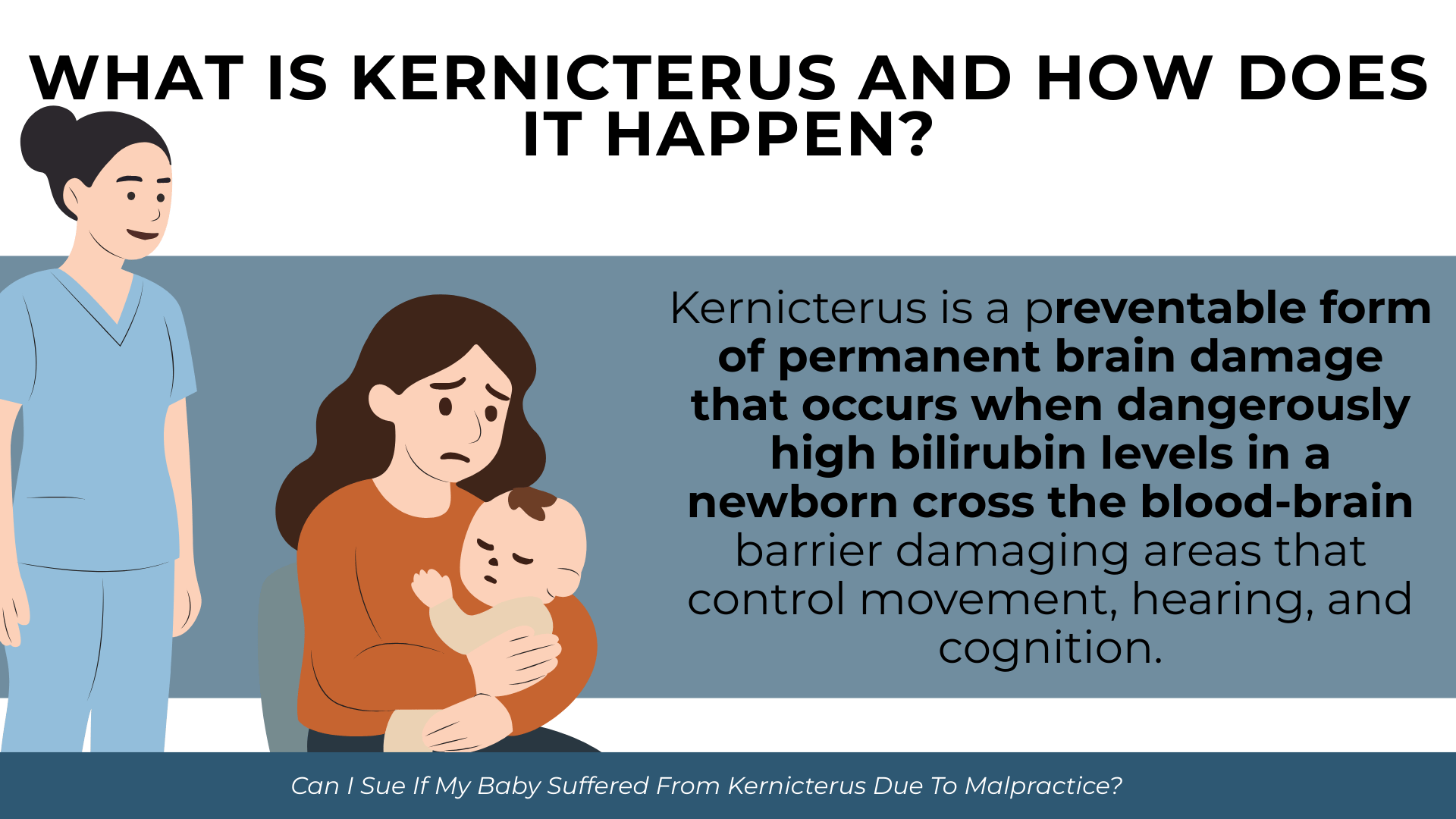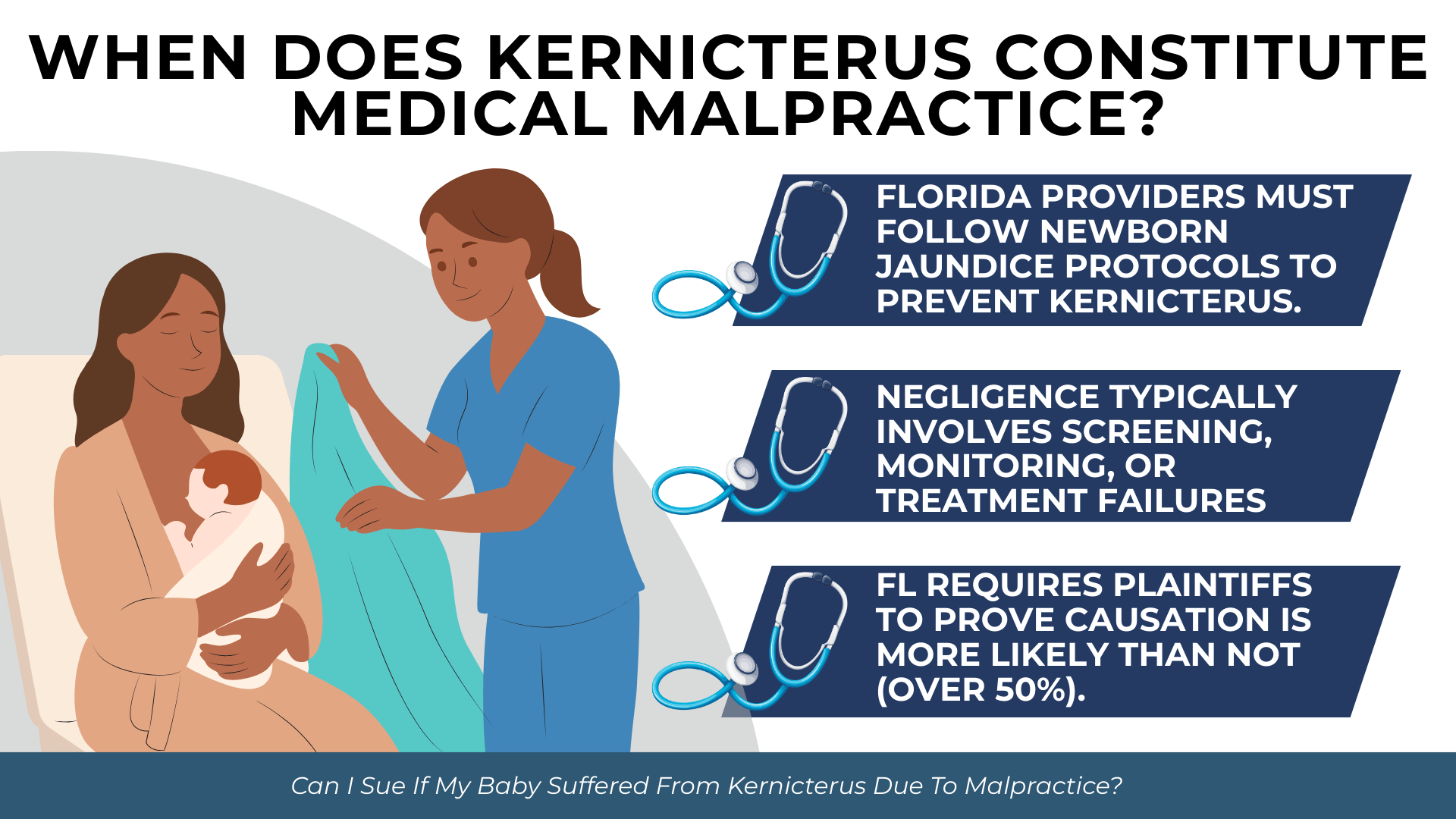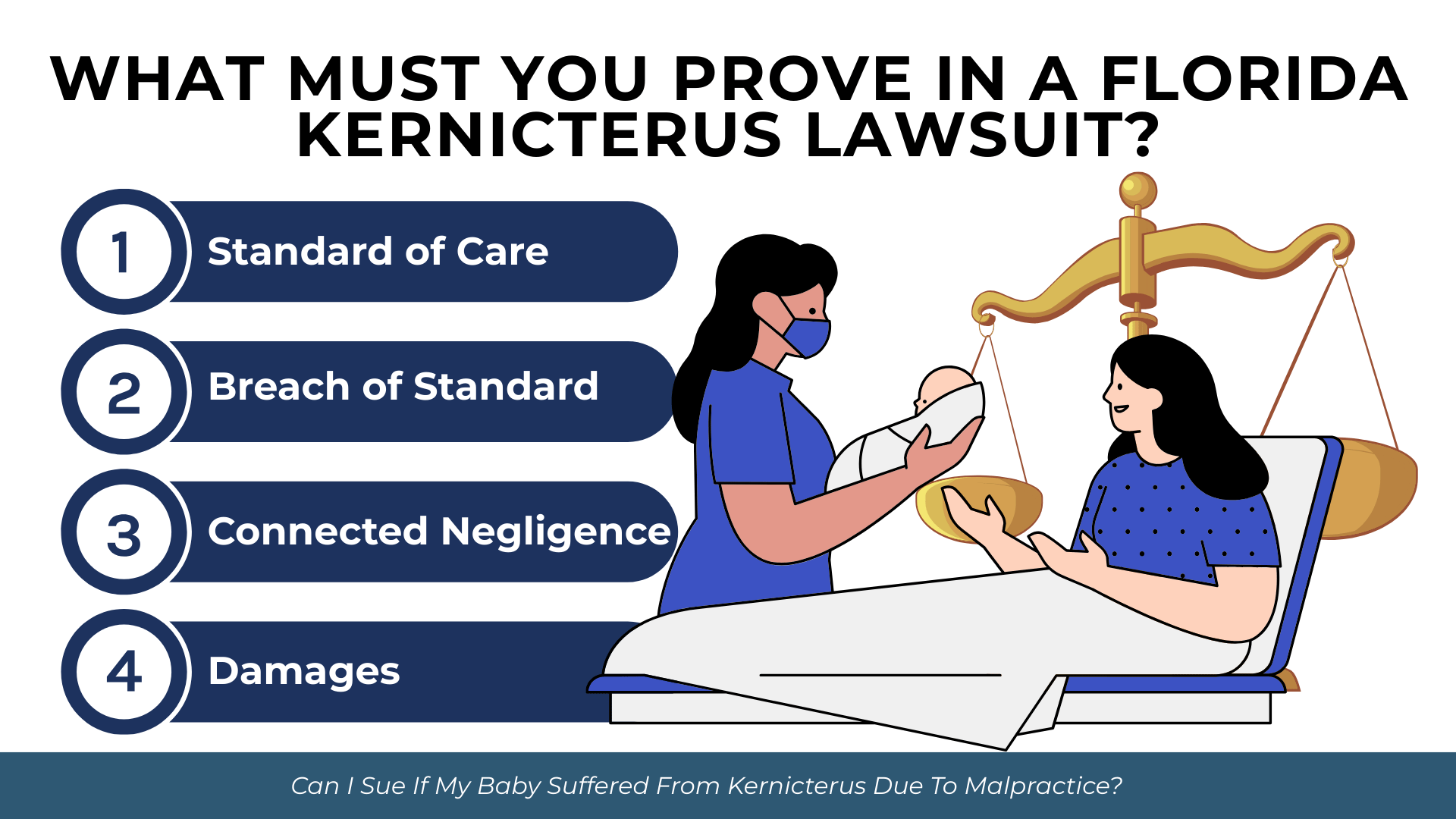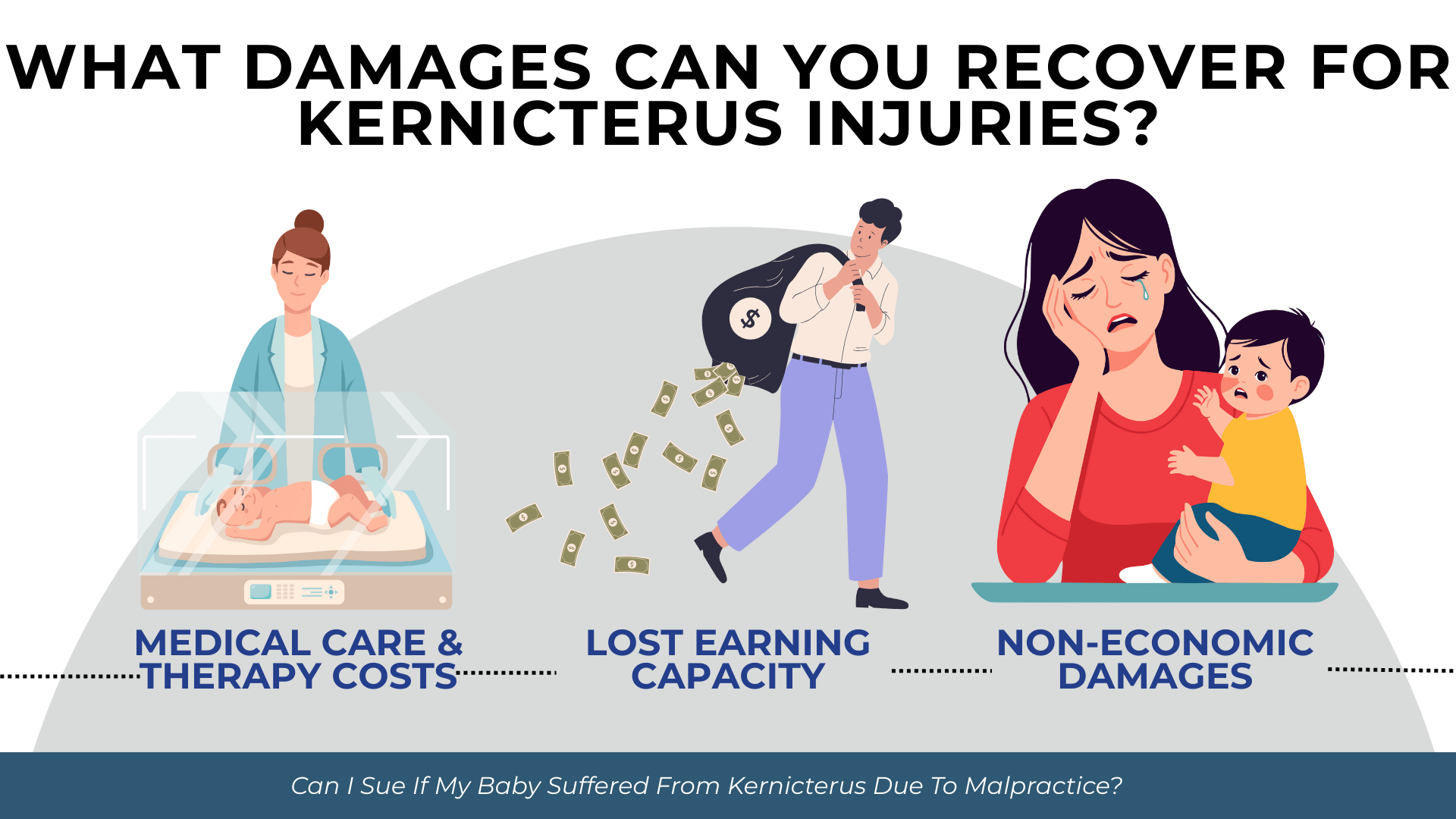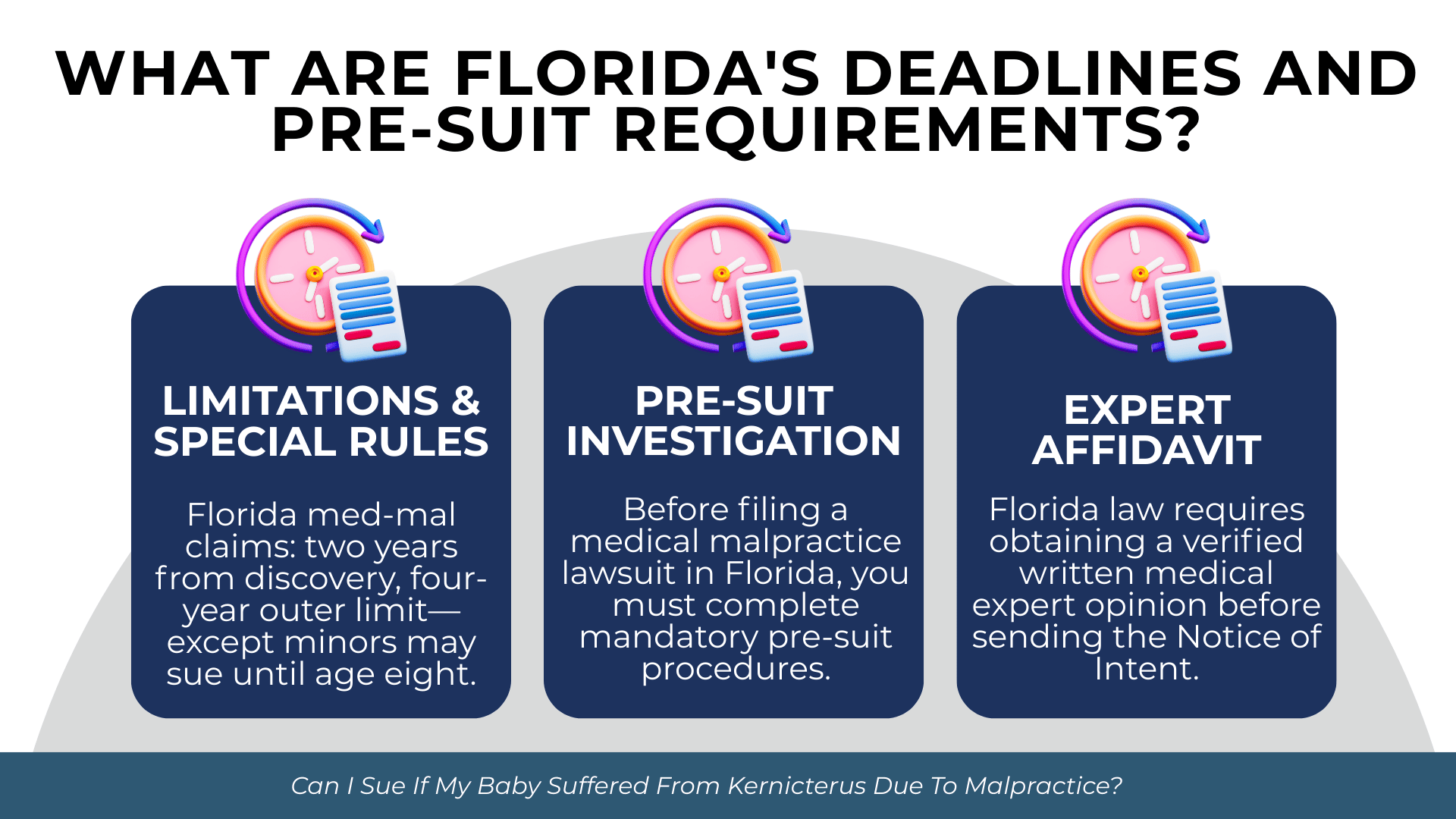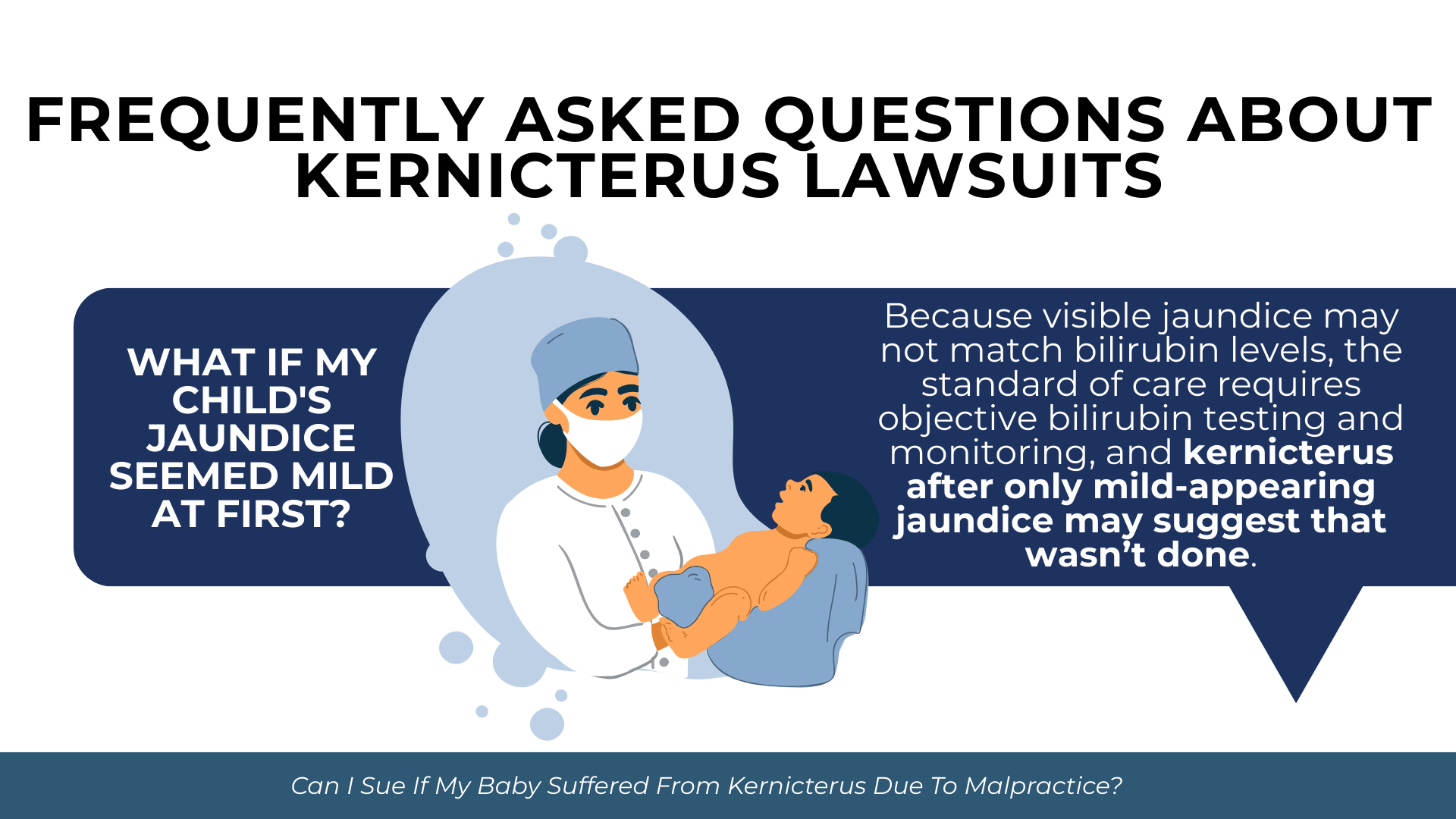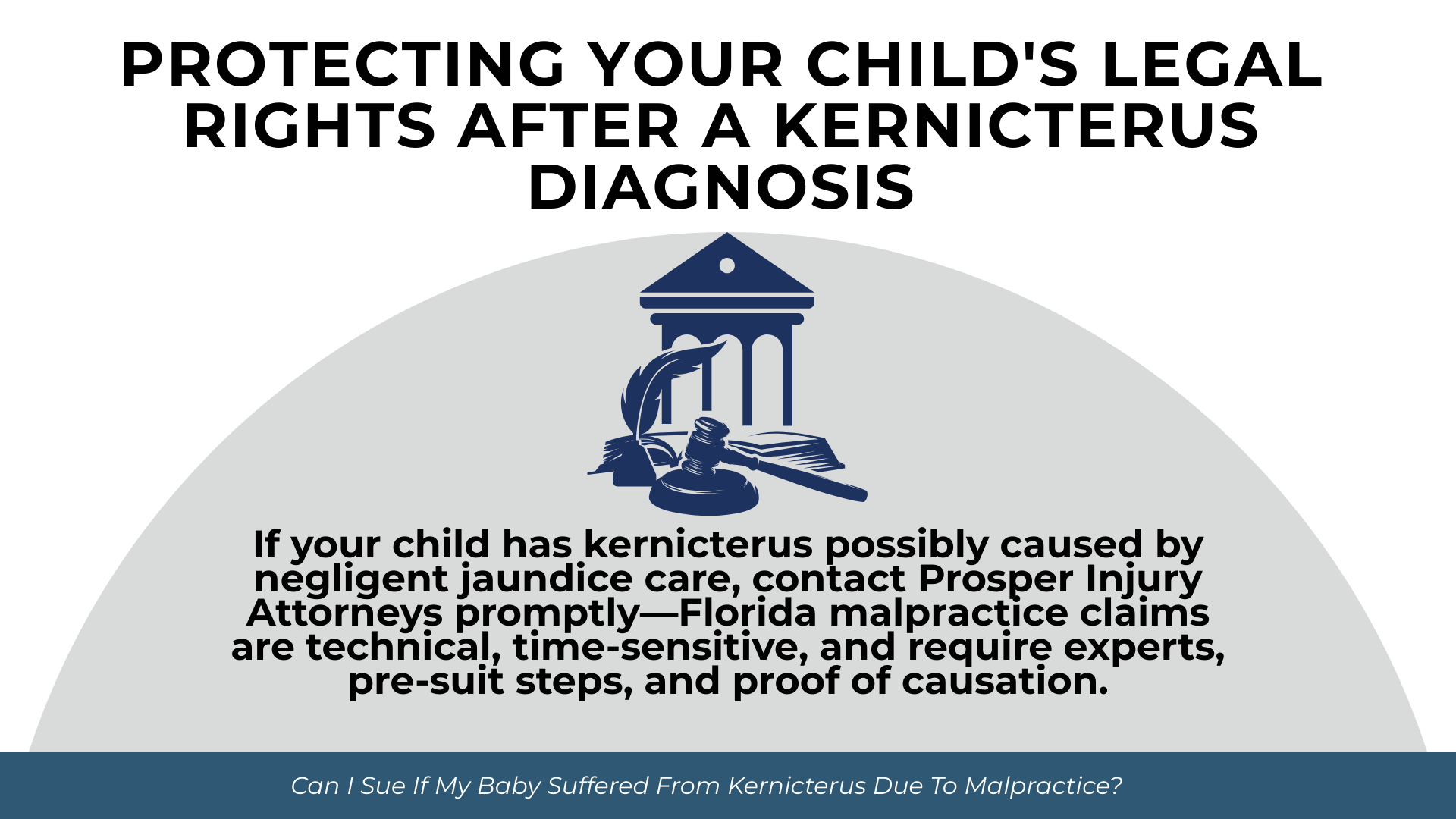When a newborn develops kernicterus—permanent brain damage caused by untreated jaundice—Florida parents often wonder whether they have grounds for a medical malpractice lawsuit. The answer depends on whether healthcare providers failed to meet the standard of care for monitoring and treating elevated bilirubin levels. Because kernicterus is considered a largely preventable condition when jaundice is properly managed, many cases do involve actionable medical negligence.
Florida law allows parents to pursue compensation when a healthcare provider’s failure to diagnose or treat newborn jaundice leads to kernicterus. These cases require proving that the provider deviated from accepted medical standards and that this deviation caused the child’s brain injury. Understanding the legal framework, deadlines, and requirements for these claims is essential for families facing this devastating diagnosis.
What Is Kernicterus and How Does It Happen?
The Medical Process Behind Kernicterus
Kernicterus occurs when high levels of bilirubin—a yellow substance produced during the normal breakdown of red blood cells—accumulate in a newborn’s brain. All babies produce bilirubin, and mild jaundice (the yellowing of skin and eyes) is common in the first days of life. The liver normally processes bilirubin and eliminates it from the body.
Problems arise when bilirubin levels climb too high, too fast, or remain elevated for too long. When this happens, bilirubin can cross the blood-brain barrier and deposit in brain tissue. This condition, called acute bilirubin encephalopathy, can progress to kernicterus if not treated promptly.
Warning Signs That Should Prompt Treatment
Healthcare providers are trained to recognize the warning signs of dangerous hyperbilirubinemia. Visible jaundice that appears within the first 24 hours of life is particularly concerning and warrants immediate evaluation. Jaundice that spreads rapidly from the face to the chest, abdomen, and extremities signals rising bilirubin levels.
Behavioral changes also indicate potential bilirubin toxicity. A jaundiced baby who becomes lethargic, feeds poorly, develops a high-pitched cry, or exhibits abnormal muscle tone requires urgent assessment. These neurological symptoms suggest bilirubin may already be affecting the brain.
How Kernicterus Causes Permanent Brain Damage
When bilirubin deposits in the brain, it damages specific regions responsible for movement, hearing, and cognition. The basal ganglia and brainstem are particularly vulnerable. This damage is irreversible once it occurs.
Children with kernicterus typically experience a combination of permanent disabilities. These commonly include cerebral palsy (specifically the athetoid type involving involuntary movements), hearing loss or deafness, vision problems, intellectual disabilities, and dental enamel abnormalities. The severity varies, but most affected children require lifelong care and support.
When Does Kernicterus Constitute Medical Malpractice?
Call us today at (305) 694-2676 or
contact us online for a free case evaluation.
Hablamos español.


The Standard of Care for Monitoring and Treating Newborn Jaundice
Under Florida law, healthcare providers must deliver care consistent with “that level of care, skill, and treatment which, in light of all relevant surrounding circumstances, is recognized as acceptable and appropriate by reasonably prudent similar health care providers.” Fla. Stat. § 766.102(1). For newborn jaundice, this standard is well-established through clinical guidelines and universal screening protocols.
The standard of care for preventing kernicterus includes assessing every newborn for jaundice risk factors before discharge, measuring bilirubin levels when jaundice is observed or risk factors are present, plotting bilirubin results against hour-specific nomograms to determine risk, initiating phototherapy when bilirubin reaches treatment thresholds, and arranging appropriate follow-up for early-discharged newborns. These protocols exist precisely because kernicterus is preventable when jaundice is properly monitored and treated.
Common Ways Healthcare Providers Breach This Standard
Medical negligence in kernicterus cases typically involves failures in the screening, monitoring, or treatment process. The following actions or omissions commonly form the basis for kernicterus malpractice claims:
- Failing to assess a newborn’s risk factors for severe jaundice before hospital discharge
- Not ordering bilirubin testing when a newborn appears visibly jaundiced
- Misinterpreting bilirubin test results or failing to plot them on age-specific nomograms
- Discharging a jaundiced newborn without arranging timely follow-up care
- Delaying phototherapy when bilirubin levels reach treatment thresholds
- Failing to recognize and respond to signs of acute bilirubin encephalopathy
- Not ordering exchange transfusion when phototherapy proves insufficient
According to research published in Hospital Pediatrics (2022), kernicterus occurs at a rate of approximately 0.5 per 100,000 neonatal hospitalizations in the United States. The study noted higher rates among Asian/Pacific Islander infants (1.04 per 100,000) and Black infants, suggesting that risk factor assessment must account for demographic variations in jaundice risk.
Proving the Provider’s Negligence Caused the Injury
Florida requires plaintiffs to prove causation under the “more likely than not” standard—meaning there must be greater than 50 percent probability that the defendant’s negligence caused the injury. Gooding v. University Hospital Building, Inc., 445 So. 2d 1015 (Fla. 1984). This means you must show that proper monitoring and treatment would more likely than not have prevented your child’s kernicterus.
Florida does not recognize the “loss of chance” doctrine. If your child had less than a 50 percent chance of avoiding brain damage even with proper care, you cannot recover damages. However, because kernicterus is highly preventable with appropriate intervention, most cases involve scenarios where timely treatment would have prevented the injury entirely.
What Must You Prove in a Florida Kernicterus Lawsuit?
Establishing the Applicable Standard of Care
Your case must first establish what a reasonably prudent healthcare provider would have done under the circumstances. For kernicterus cases, this typically involves demonstrating the accepted protocols for jaundice screening, bilirubin monitoring, and treatment thresholds that applied at the time of your child’s care.
Under Fla. Stat. § 766.102(5)(a), expert witnesses establishing the standard of care must practice in the same specialty as the defendant. If a pediatrician is accused of negligence, your expert must be a pediatrician who has devoted professional time during the three years immediately preceding the incident to active clinical practice, teaching, or research in pediatrics.
Demonstrating How the Provider Deviated From That Standard
Once the standard is established, you must prove through expert testimony that the defendant’s conduct fell below that standard. The expert must identify specific actions or omissions that constituted a breach. Fla. Stat. § 766.102(1) places the burden on the claimant to prove by the greater weight of evidence that the defendant’s actions “represented a breach of the prevailing professional standard of care.”
Medical records are critical evidence in this analysis. The timing of jaundice observations, bilirubin measurements, treatment decisions, and discharge planning are all documented in hospital records. Gaps in documentation or delays between concerning findings and clinical responses often reveal the breach.
Connecting the Negligence to Your Child’s Brain Damage
Causation requires linking the specific breach to the kernicterus diagnosis. Your expert must explain the medical mechanism by which the provider’s failure led to bilirubin accumulation and brain damage. This typically involves showing that if bilirubin had been monitored appropriately, phototherapy would have been initiated earlier, and bilirubin levels would have been controlled before reaching neurotoxic levels.
The Ruiz v. Tenet Hialeah Healthsystem, Inc., 260 So. 3d 977 (Fla. 2018) decision clarified that the defendant’s negligence need not be the primary cause of injury—only a “substantial factor” in bringing about the result. A provider cannot escape liability by pointing to other contributing factors if their own negligence substantially contributed to the harm.
Documenting Your Child’s Injuries and Losses
The final element requires proving the nature and extent of damages. For kernicterus cases, this involves documenting your child’s specific disabilities—whether cerebral palsy, hearing loss, cognitive impairment, or other conditions—and quantifying the lifetime impact. Medical records, developmental assessments, and testimony from treating physicians establish the diagnosis and prognosis.
What Damages Can You Recover for Kernicterus Injuries?
Lifetime Medical Care and Therapy Costs
Children with kernicterus often require extensive medical care throughout their lives. Florida allows recovery of both past medical expenses already incurred and future medical costs reasonably certain to be needed. Following the Florida Supreme Court’s decisions in Estate of McCall v. United States, 134 So. 3d 894 (Fla. 2014) and North Broward Hospital District v. Kalitan, 219 So. 3d 49 (Fla. 2017), there are currently no enforceable caps on these damages in medical malpractice cases.
Economic damages in kernicterus cases commonly include:
- Ongoing medical treatment including neurology, audiology, and ophthalmology care
- Physical therapy, occupational therapy, and speech therapy
- Assistive devices including hearing aids, wheelchairs, and communication equipment
- Home modifications required for accessibility
- Special education services and tutoring
- In-home nursing care or personal attendant services
- Future surgeries or medical procedures
Life care planners often assist in calculating these costs by projecting the child’s needs across their expected lifespan.
Lost Earning Capacity
Because kernicterus typically causes permanent disabilities affecting cognitive and physical function, affected children often face diminished earning capacity as adults. Economists can project what the child would likely have earned over a working lifetime and calculate the reduction caused by the disability.
This analysis considers educational attainment, labor market conditions, and the specific limitations imposed by the child’s injuries. Even for young children, these future losses can be substantial and are recoverable as economic damages.
Non-Economic Damages for Pain, Suffering, and Quality of Life
Florida permits recovery of non-economic damages including physical pain and suffering, mental anguish, loss of enjoyment of life, and loss of capacity for normal activities. For a child with kernicterus who will live with permanent disabilities, these damages reflect decades of diminished quality of life.
Courts permit often “per diem” arguments allowing attorneys to suggest a daily value for pain and suffering multiplied by life expectancy. Given that kernicterus causes lifelong impairment, non-economic damages in these cases can be significant.
What Are Florida’s Deadlines and Pre-Suit Requirements?
Get started with your complimentary case evaluation today;
call us at (305) 694-2676 or reach us online using our
secure contact form.


The Statute of Limitations and Special Rules for Minors
Florida’s medical malpractice statute of limitations generally requires filing within two years from when the injury was discovered or should have been discovered with due diligence. Fla. Stat. § 95.11(4)(b). A four-year statute of repose creates an absolute outer deadline from the date of the negligent act.
However, Florida provides critical protection for injured children. Under Fla. Stat. § 95.11(4)(b), the four-year statute of repose does not bar an action brought on behalf of a minor if filed on or before the child’s eighth birthday. This extended deadline recognizes that birth injuries may not become fully apparent until developmental milestones are missed.
The Tanner v. Hartog, 618 So. 2d 177 (Fla. 1993) decision established that the statute of limitations begins when a plaintiff has knowledge of both the injury and a “reasonable possibility that the injury was caused by medical malpractice.” For kernicterus, this typically means when parents learn both that their child has brain damage and that it may have resulted from untreated jaundice.
Mandatory Pre-Suit Investigation and Notice
Before filing a medical malpractice lawsuit in Florida, you must complete mandatory pre-suit procedures. Fla. Stat. § 766.106 requires serving a Notice of Intent to Initiate Litigation on each prospective defendant at least 90 days before filing suit. This notice must be sent by certified mail and must include specific information.
The Notice of Intent must contain the following:
- A list of all healthcare providers who treated your child for related conditions after the alleged negligence
- All known providers who treated your child during the two years before the alleged act
- Copies of all medical records your expert relied upon in forming their opinion
- An executed HIPAA authorization form per Fla. Stat. § 766.1065
- The verified written opinion of a qualified medical expert
Once notice is mailed, a 90-day pre-suit investigation period begins during which the statute of limitations is tolled. Defendants must respond with a rejection, settlement offer, or arbitration offer before the period expires.
The Expert Affidavit Requirement
Florida law requires obtaining a verified written medical expert opinion before sending the Notice of Intent. Fla. Stat. § 766.203 mandates that this opinion corroborate that reasonable grounds exist to support the claim. The expert must be qualified under Fla. Stat. § 766.102(5), which requires specialty matching and recent active practice.
For kernicterus cases against pediatricians, your expert must be a pediatrician who has engaged in active clinical practice, teaching, or clinical research in pediatrics during the three years immediately preceding the incident. If a neonatologist provided the care, a neonatologist expert is required.
Frequently Asked Questions About Kernicterus Lawsuits
How common is kernicterus in newborns today?
Kernicterus has become rare due to widespread jaundice screening and treatment protocols. According to research published in Hospital Pediatrics (2022), the condition occurs at approximately 0.5 per 100,000 neonatal hospitalizations, down from 0.7 per 100,000 a decade earlier. The continued occurrence of any cases, given available prevention measures, often reflects failures in the screening and treatment process.
Can kernicterus be prevented with proper medical care?
Yes. Kernicterus is considered a largely preventable condition when healthcare providers follow established protocols for identifying at-risk newborns, monitoring bilirubin levels, and initiating timely phototherapy. The fact that kernicterus rates have declined significantly demonstrates that proper medical management prevents nearly all cases.
What is the deadline to file a kernicterus lawsuit in Florida?
Florida’s standard medical malpractice statute of limitations is two years from discovery of the injury. However, for claims brought on behalf of minors, the four-year statute of repose does not apply if the lawsuit is filed before the child’s eighth birthday. This provides additional time for families whose children’s injuries become apparent gradually.
Do I need an expert witness for a kernicterus case?
Yes. Florida law requires expert testimony to establish the standard of care, prove breach, and demonstrate causation in medical malpractice cases. Under Fla. Stat. § 766.203, you must obtain a verified written expert opinion before even sending the required pre-suit notice. The expert must practice in the same specialty as the defendant provider.
What if my child’s jaundice seemed mild at first?
The severity of visible jaundice does not always correlate with bilirubin levels, which is precisely why objective testing is required. Healthcare providers cannot rely solely on visual assessment. If your child developed kernicterus despite appearing only mildly jaundiced, this may indicate a failure to properly measure and monitor bilirubin levels as the standard of care requires.
Protecting Your Child’s Legal Rights After a Kernicterus Diagnosis
A kernicterus diagnosis changes a family’s life permanently. Understanding that this condition is preventable—and that Florida law provides a pathway to hold negligent providers accountable—is the first step toward securing resources for your child’s lifetime care needs. The legal requirements for these cases are specific, including expert qualifications, pre-suit procedures, and the burden of proving causation to a greater-than-50-percent probability.
Time limits apply even though they are extended for claims involving minors. Preserving medical records, securing qualified expert review, and completing the mandatory pre-suit investigation all take time. Beginning the process early ensures that critical deadlines are met and that evidence is preserved while memories and documentation remain accessible.
If your child has been diagnosed with kernicterus and you believe it resulted from failures in jaundice monitoring or treatment, contact Prosper Injury Attorneys to discuss your situation.

